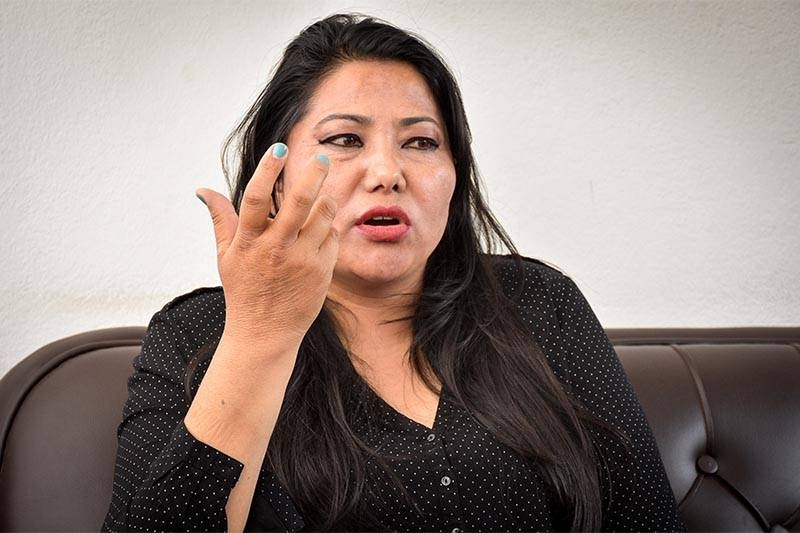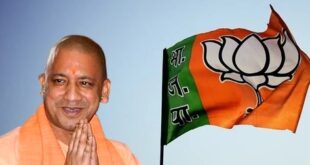 Dr. Utkarsh Sinha
Dr. Utkarsh Sinha
Nepal’s politics stands at a crossroads where the familiar old paths lead nowhere, and the new ones are strewn with thorns of uncertainty. For decades, Nepali politics has revolved around a handful of faces—K.P. Sharma Oli, Pushpa Kamal Dahal “Prachanda,” and Sher Bahadur Deuba. Their musical chairs of power and the making-and-breaking of coalitions have become a tiresome, disheartening spectacle for the nation.
Against this backdrop, as leftist factions once again attempt “unity,” one bold and combative voice has distanced itself from this hollow exercise. That voice belongs to Ram Kumari Jhakri. The decision by Jhakri, Secretary of the CPN (Unified Socialist), to step away from this so-called unification process is not merely a political statement; it signals a deeper generational revolt challenging Nepal’s rotten political system. The question is: can Jhakri, leading this revolt, carve out a new political space for herself and Nepal’s younger generation?
CPN (Unified Socialist) leader Ram Kumari Jhakri has announced that her political journey with the party has ended. Speaking at a press conference in Kathmandu on Wednesday, Jhakri said the party will officially dissolve at 1 p.m. that day, ending her involvement. “My chapter with the party is closed. This is the current stage of our political journey,” she said. She emphasized that after the Gen-Z movement, Nepal’s major political parties have been exposed in the eyes of the people.
Jhakri stressed that political parties must take responsibility for protecting democracy and ensuring peace and security in the country. Criticizing past party mergers, she argued that the unity between UML and Maoist Center, which formed the Nepal Communist Party (NCP), had already destroyed internal democracy. According to her, the ongoing merger between Maoist Center, Unified Socialist, and seven other leftist groups will further weaken democratic values.

The Illusion of Unity and Jhakri’s Disillusionment The current leftist unity effort feels like a pale imitation of the failed 2018 experiment that created the Nepal Communist Party (NCP). That government, formed with a near two-thirds majority, collapsed within three years due to top leaders’ personal egos and naked power struggles. Today, the same leaders are singing the same tune of unity, driven by the same old issues and personal ambitions. For them, this “unity” is not about ideology or the nation’s future, but a mathematical equation to win the next election and divvy up power.
Leaders like Ram Kumari Jhakri, whose political rise came from student movements and grassroots struggle, see through this charade. Her decision to distance herself is an admission that no new direction can emerge by aligning with these old leaders. For her, this “unity” is a cage that would imprison fresh ideas, energy, and the aspirations of a new generation. Jhakri’s move is a courageous declaration that she will not board a bus whose driver has repeatedly crashed it into a ditch. She is pointing toward a new path—one that emerges not from closed party headquarters, but from the frustrations and dreams of Nepal’s youth.
In Search of a New Political Path So what is Jhakri’s “new direction”? It cannot be limited to forming another leftist faction or joining a different party. It is an attempt to challenge the very way politics is done in Nepal. This could take several forms:
- Building a Generational Alliance: Jhakri understands that disillusionment with the system is not confined to her party. Leaders like Gagan Thapa and Bishwa Prakash Sharma in the Nepali Congress are also battling their own aging leadership. The opportunity lies in channeling this generational discontent into an ideological platform that transcends party lines, focusing on good governance, transparency, anti-corruption, and economic opportunities.
- Issue-Based Politics: For decades, Nepali politics has revolved around identity and power-sharing. Jhakri could shift it toward policy and performance. Issues like jobs for youth, women’s rights, quality education, healthcare, and climate change—often absent from old leaders’ speeches—could become the core of her politics.
- A Movement Beyond Organization: Established parties draw strength from their cadres and organizational structures. But in today’s digital age, a strong idea and a credible face can spark a movement that transcends traditional boundaries. Jhakri could leverage her fearless image and outspokenness to build such a movement, connecting directly with youth, professionals, and citizens disillusioned with the current system.
However, Ram Kumari Jhakri’s path is far from easy. Nepal’s political landscape is deeply patriarchal and hierarchical. Breaking the stronghold of established male leaders is a massive challenge for a woman leader. Building a new political movement also requires significant financial resources and organizational skills, where established parties leave her far behind. She will face accusations of being a “party splitter” or “overly ambitious.”
Yet, the possibilities are far more compelling. Nearly 40% of Nepal’s population is young, and this generation is no longer willing to wait. Recent “Gen-Z” protests have shown their tremendous capacity to organize and raise their voice. Public disillusionment with the political class is at its peak. Voters are ready to give new, credible faces a chance, as proven by independent candidates’ victories in recent elections.
Ram Kumari Jhakri stands at a crossroads of risk and opportunity. She has taken the first and hardest step by rejecting the status quo. Her success now depends on whether she can transform her personal revolt into a collective youth movement. Can she collaborate with other young leaders to create a shared minimum program? And most importantly, can she convince the country that she offers not just criticism, but a concrete alternative vision?
Nepal’s youth revolt is no longer confined to street slogans; it is trying to take political shape. Ram Kumari Jhakri could be a key architect in giving it form. If she succeeds in carving out her space, it will not only be her personal victory, but proof that Nepali politics is finally ready to shed the burden of its old generation and step toward the future.
(Author is a senior journalist and expert of International Politics)
 Jubilee Post News & Views
Jubilee Post News & Views




